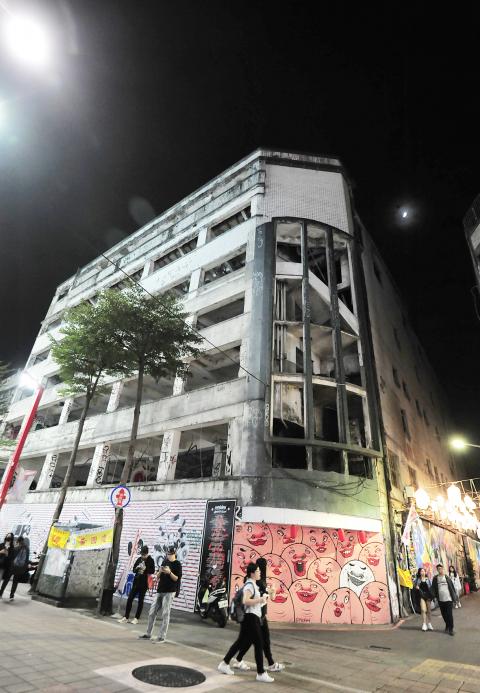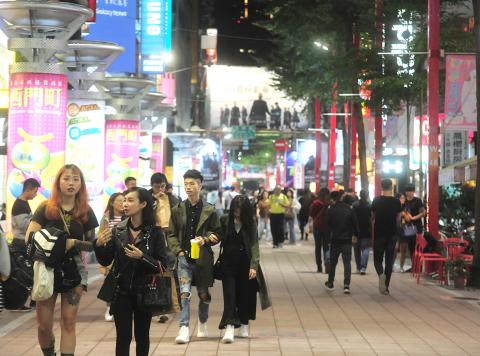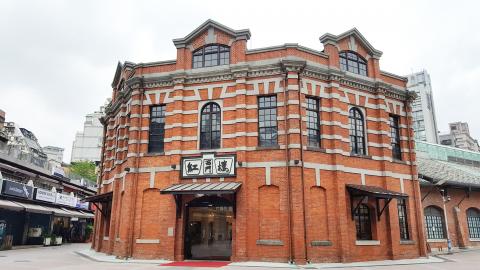Taipei Movie Theater opened its doors for the first time during the 1950s and was the number one choice for today’s sexagenarians and septuagenarians to watch movies in their youth. Wu Yi-shui, who was the local borough warden for 12 terms, says: “Back then the place was full of moviegoers. A small army of ticket scalpers plied their trade up and down the streets.” At first, Taipei Movie Theater mainly showed Japanese films and was as popular as Taipei’s First Theater. It was only later that Chou Chen Yu-shu, who would become known as the “Father of the Taiwanese film industry,” opened a series of three movie theaters known as the three “shengs.”
The original iteration of Taipei Movie Theater was constructed and operated by the Chou family, who made their wealth within the construction industry: why they decided to open a movie theater has been lost to the annals of history. Based upon information gleaned from the construction permit, it would have cost no more than NT$120,000 to build. The property rights to the building were inherited by later generations of the Chou family, and there are currently more than 10 people in possession of property or land rights: Some hold an interest in the property but hold no land rights; others possess land rights without a stake in the building. Additionally, some family members emigrated overseas or could not be contacted. The complexity of the ownership structure led to a situation in which the theater has been out of operation for nearly 30 years.
Wu says that despite sharing the same surname, Taipei Movie Theater, built by the Chou family, and LUX Cinema, also in Taipei’s Ximending area and constructed by Chou Chen Yu-shu, were most likely unrelated. Wu says that Chou Chen Yu-shu originally started out selling noodles, but after making his fortune in real estate, opened a series of movie theaters, including the three “shengs” — LUX Cinema, Hsinsheng Theater and Kuosheng Theater. According to Wu, the advent of the video cassette, cable television and, in more recent times, smart phones, have all had an impact, and today the number of moviegoers coming to Ximending pales in comparison with years past.

Photo: Wang Yi-sung, Liberty Times
照片:自由時報記者王藝菘
Taipei Movie Theater had a good run: in addition to being the first movie theater to open on what is now known as Ximending’s “Cinema Street,” it also boasted the largest movie theater auditorium and could seat 1,700 moviegoers. Later, when showing the Western movie The Winners (aka My Way), it established a new box office record for Taiwan, breaking the NT$10 million mark. At the time, the majority of tickets were priced around NT$10-NT$30, compared to today’s ticket prices of NT300-NT$400 per movie.
At the end of the 1970s, Taipei Movie Theater screened the Taiwanese-made 3D martial arts film 1,000 Miles to Recover a Knife and gradually became known as the leading theater for screening Taiwanese movies. As the movie industry fell into decline, the theater was unable to avoid the knock-on effect and one year after screening Tsui Hark’s martial arts film The Swordsman, Taipei Movie Theater closed its doors in 1991. The theater was subsequently converted into a Japanese pachinko slot machine and arcade game parlor, but after Taipei City Government initiated a campaign to root out gambling arcades, the building fell into disuse.
(Translated by Edward Jones, Taipei Times)

Photo: Wang Yi-sung, Liberty Times
照片:自由時報記者王藝菘
一九五十年代開幕的「台北戲院」,是六、七十歲老台北人看電影的首選地點。在當地擔任十二屆里長的吳益水說:「當時看電影的人好多啊。路上多的是賣黃牛票的人。」最初該戲院是播放日片為主,與當時的「第一劇場」齊名,之後才有「電影之父」周陳玉樹的三「聲」系列電影院。
「台北戲院」最早是周氏家族自建並經營;據悉,周氏家族原本是建築業起家,興建戲院的原因已經不可考,根據建照資訊,當時標註工程費用僅十二萬元。而後隨著產權繼承,目前持有建物與土地的產權超過十人,部分是有建物、沒土地,部分有土地、沒建物產權,加上部分家族成員已移居海外、聯絡不上,因此停業近三十年。
吳益水說,興建「台北戲院」的周氏家族與興建樂聲戲院的西門町電影王國之父周陳玉樹應該是沒有關聯,後者最早是賣麵,之後因土地致富才開設新生、樂聲、國聲等三「聲」戲院。但他感嘆說,受到錄影帶、第四台,乃至於現在的智慧型手機發達影響,現在西門町看電影的人潮已經不復從前。

Photo: Yang Hsin-hui, Liberty Times
照片:自由時報記者楊心慧攝
「台北戲院」早年在台灣電影史上留下不少輝煌紀錄,除了是西門町「電影街」首家開幕電影院,更擁有當時最大放映廳。根據描述,可容納超過一千七百人,後因為播放洋片「奪標」,締造放映台灣電影史上首部破千萬票房的戲院,當時的電影票頂多幾十元,不像現在三、四百元起跳。
一九七十年代後期,曾放映台灣自製的3D立體武俠電影「千刀萬里追」,也逐步轉型為放映國片的龍頭戲院;無奈隨著電影產業沒落,放映完徐克武俠片「笑傲江湖」後一年就宣告停業,之後轉為柏青哥與電玩場,因市府掃蕩賭博電玩,自此荒廢。
(自由時報記者徐義平)
讀後練習FOLLOW UP
The Red House Theater
The Red House Theater (紅樓劇場) in Taipei’s Ximending area is a historic theater dating back to 1908 and the Japanese colonial era. Designed by Japanese architect Kondo Juro, it was originally a market building, named the Octagon, but the second floor was subsequently converted into a traditional theater which then began screening films in 1945.
It was the place to be seen during the 1950s and a popular haunt for youngsters back in the day. However, the theater gradually fell into disuse during the 1970s as newer, more modern movie theaters opened up nearby.
The theater was listed as a Class Three Historical Site in 1997 and re-opened in 2002 as an arts venue following a lengthy period of restoration. Today the Red House continues to be an important landmark in the bustling Ximending area.
(Edward Jones, Taipei Times)

US President Donald Trump on Monday last week signed the TAKE IT DOWN ACT (Tools to Address Known Exploitation by Immobilizing Technological Deepfakes on Websites and Networks Act), bipartisan legislation that enacts stricter penalties for the distribution of non-consensual intimate imagery, sometimes called “revenge porn,” as well as deepfakes created by artificial intelligence. The measure, which goes into effect immediately, was introduced by Sen. Ted Cruz, a Republican from Texas, and Sen. Amy Klobuchar, a Democrat from Minnesota, and later gained the support of First Lady Melania Trump. Critics of the measure, which addresses both real and artificial intelligence-generated imagery, say

Cats ruled in ancient Egypt—and not just in their own minds. These clever, graceful creatures were so deeply respected by the Egyptians that harming one could lead to severe punishment, even death. But why did the Egyptians hold cats in such high regard? It wasn’t just because they were cute; cats played a crucial role in protecting the country’s grain stores from pests. As guardians of Egypt’s food supply, they were seen as sacred animals. The Egyptians honored them through Bastet, the cat-headed goddess of protection, the home and fertility. Egyptians didn’t just love cats; they worshipped them. Cats lived in luxury,

A: Wanna go see a movie during the three-day weekend for the Dragon Boat Festival? B: Sure, I wanna see “Mission: Impossible – The Final Reckoning.” A: Rumor has it that this may be actor Tom Cruise’s last mission with the Mission: Impossible action movie franchise. B: Tom was only 34 when the first installment of the series was released in 1996. Now, he’s 63 and the eighth installment is out. A: I hope he’ll stay with the series. Let’s go see him fight against AI this weekend. A: 端午節三天連假週末要不要去看電影? B: 好啊我想看 《不可能的任務:最終清算》! A: 這有可能是湯姆克魯斯最後一次為動作片《不可能》系列出任務。 B:

Continued from yesterday(延續自昨日) https://www.taipeitimes.com/News/lang Despite these advantages, there are still some challenges when it comes to housing data centers under the ocean. One problem is that they’re difficult to access for repair or replacement. __4__ This presents a significantly higher level of complexity than handling traditional land-based data centers. Another challenge is energy reliability. Many underwater data centers rely on offshore renewable energy sources, which can be unstable due to environmental factors. While underwater data centers offer exciting possibilities, overcoming the associated challenges is essential to realizing their full potential. 儘管有這些優勢,在海底安置資料中心仍存在一些難關。一個問題是難以進入水下資料中心進行修理或更換。這需要派人員到水下或將資料中心運送到維修站。這比處理傳統的陸上資料中心還要複雜許多。另一個難關是能源可靠性。許多水下資料中心依賴近海再生能源,而這些能源可能會因環境因素而不穩定。雖然水下資料中心提供了令人興奮的可能性,但要充分發揮其潛力,克服相關的難題是相當重要的。 What Did You Learn? (A) However, the expense of housing and maintaining the facilities